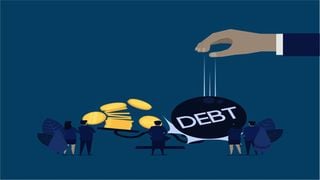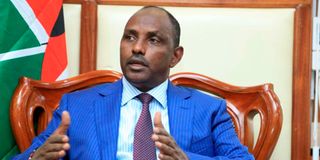
Kenya's debt crisis has been cooking since the Jubilee administration took charge.
| FileFinance and Markets
Premium
Kenya targets new loans to repay old ones
What you need to know:
- The World Bank and the International Monetary Fund urged G20 countries to establish the Debt Service Suspension Initiative in May 2020.
Kenya will take new loans to repay the Eurobond when they fall due as part of its debt management strategy to reduce pressure on principal repayments.
The National Treasury says the country has a solid plan to deal with the Eurobond loans, which started maturing last year, all the way to 2024. This means that Kenya will be back in the international markets soon, seeking new loans to repay the old ones, in what will see the loan refinanced in perpetuity, with the taxpayer only paying the interest.
"We have no issue with the Eurobond repayments because it is going to be rolled over and we have made provisions for servicing and also replacing,” Treasury Cabinet Secretary Ukur Yatani told the Sunday Nation in an exclusive interview.
Rolling over is a debt strategy where instead of repaying the principal of a loan when it falls due, a country decides to enter into a new agreement with the lender to give it a new loan to repay the first debt.
Refinancing debt
Though it is a preferred mode of refinancing debt worldwide, it comes with a roll over risk where the new loan can come at a higher rate thereby forcing the borrower to pay more in interest repayments.

National Treasury Cabinet Secretary Ukur Yatani during an interview at his office on February 10, 2021.
Kenya went for its first Eurobond in June 2014 where a total of Sh280 billion was borrowed in five and 10-year tranches.
The government went back for another Eurobond in 2018 year where it netted Sh202 billion in 10 and 30-year tranches.
In 2019, Kenya was back at the international markets where it raised its Sh210 billion in its third Eurobond named the Kachumbari bond, that also repaid other loans and fund unspecified infrastructure projects. The loan was issued in a dual tranche, one maturing in seven years and the other after 12 years. In total, the country has raised about Sh692 billions in Eurobonds alone, which started maturing last year all the way to 2024.
Yatani has moved to calm fears that Kenya is headed to a debt crisis, given that it is planning to seek another parliamentary approval to increase the debt ceiling above Sh9 trillion to support its borrowing spree.

The entrance to the National Treasury building in Nairobi.
Treasury is also exploring various alternative financing options such as private placement, diaspora bonds, Islamic bonds (Sukuk), and issuance of sovereign green bonds over the medium term to finance climate friendly public projects.
Sh7.2 trillion
By the end of December 2020, Kenya's debt had grown to Sh7.2 trillion, which is equivalent to 65.6 percent of the GDP. Total external debt was Sh3.7 trillion while the domestic debt was Sh3.4 trillion.
The Public Finance Management Act, 2012 sets the statutory debt ceiling at Sh9 trillion. At the current borrowing pace of about Sh1 trillion per year, this ceiling is going to be hit before the end of the next financial year.
The World Bank and the International Monetary Fund urged G20 countries to establish the Debt Service Suspension Initiative in May 2020.
The Debt Service Suspension Initiative (DSSI), is a programme to help countries concentrate their resources on fighting the pandemic and safeguarding the lives and livelihoods of the most vulnerable people.





